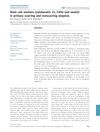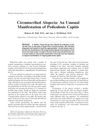
Different stem cells are key for hair growth and health, and understanding their regulation could help treat hair loss.
 September 2023 in “Journal of The American Academy of Dermatology”
September 2023 in “Journal of The American Academy of Dermatology” Raman spectroscopy is promising for measuring and enhancing drug delivery in alopecia treatments.
 11 citations,
May 2021 in “Dermatologic clinics”
11 citations,
May 2021 in “Dermatologic clinics” PRP and cell therapies may help with hair loss, but more research is needed.
 1 citations,
July 2023 in “Cutis”
1 citations,
July 2023 in “Cutis” Scalp rolling might help regrow hair in people with a hair loss condition called Alopecia Areata.
 June 2023 in “British Journal of Dermatology”
June 2023 in “British Journal of Dermatology” Baricitinib was effective and safe for severe hair loss treatment over 6 months.
 March 2023 in “International journal of trichology”
March 2023 in “International journal of trichology” Six genetic conditions are often linked to complete scalp hair loss in children.
 8 citations,
August 2021 in “Computational and Mathematical Methods in Medicine”
8 citations,
August 2021 in “Computational and Mathematical Methods in Medicine” Machine learning can accurately identify Alopecia Areata, aiding in early detection and treatment of this hair loss condition.
 1 citations,
September 2022 in “JMIR dermatology”
1 citations,
September 2022 in “JMIR dermatology” Alopecia Areata greatly affects the quality of life and mental health of Canadian patients and their caregivers.
 February 2024 in “Biomedicines”
February 2024 in “Biomedicines” Hormones like androgens, estrogen, thyroid hormones, and stress hormones can contribute to hair loss, and treatments target these hormonal imbalances.
 10 citations,
September 2021 in “JAMA Dermatology”
10 citations,
September 2021 in “JAMA Dermatology” Different types of persistent hair loss after chemotherapy respond differently to treatments.
 54 citations,
January 2009 in “British Journal of Dermatology”
54 citations,
January 2009 in “British Journal of Dermatology” Scarring alopecia affects different hair follicle stem cells than nonscarring alopecia, and the infundibular region could be a new treatment target.
 9 citations,
April 1986 in “Postgraduate Medicine”
9 citations,
April 1986 in “Postgraduate Medicine” Hair loss has many causes and treatments, and losing some hair daily is normal; proper diagnosis is key, and minoxidil can help treat it.
 31 citations,
October 2013 in “Psychosomatics”
31 citations,
October 2013 in “Psychosomatics” Psychotropic medications can cause skin reactions, including severe conditions like SJS and TEN, and it's important for psychiatrists to recognize and manage these side effects.
 July 2018 in “Elsevier eBooks”
July 2018 in “Elsevier eBooks” Lichen Planopilaris is a hair loss condition best treated early with various medications, including hydroxychloroquine, to prevent permanent baldness.
 22 citations,
February 2002 in “Clinics in Geriatric Medicine”
22 citations,
February 2002 in “Clinics in Geriatric Medicine” Many elderly women experience unwanted facial hair and various hair loss conditions, with treatments available for each condition.
 8 citations,
January 2018 in “Journal of the American Academy of Dermatology”
8 citations,
January 2018 in “Journal of the American Academy of Dermatology” Diphenylcyclopropenone treatment helps prevent hair loss relapse in alopecia areata patients.
 3 citations,
July 2018 in “JAAPA”
3 citations,
July 2018 in “JAAPA” Some birth control pills can cause hair loss, and switching to ones with less androgen should help.
20 citations,
November 2017 in “JAAD case reports” Ustekinumab significantly improved psoriasis, vitiligo, and alopecia areata in a patient.
 June 2018 in “Disease-a-Month”
June 2018 in “Disease-a-Month” Remove inflamed cysts surgically, avoid topical antibiotics on wounds, treat skin and mouth conditions with specific medications, and address underlying causes of hair loss.
 124 citations,
October 2019 in “Frontiers in Immunology”
124 citations,
October 2019 in “Frontiers in Immunology” Janus kinase inhibitors are promising treatments for autoimmune skin diseases like eczema and psoriasis.
 4 citations,
October 2011 in “Pediatric dermatology”
4 citations,
October 2011 in “Pediatric dermatology” Head lice can cause unusual patchy hair loss.
 112 citations,
October 2005 in “Mayo Clinic Proceedings”
112 citations,
October 2005 in “Mayo Clinic Proceedings” Minoxidil and finasteride can slow hair loss and stimulate regrowth, but won't restore all lost hair or reverse complete baldness.
 1 citations,
September 2023 in “Journal of drugs in dermatology”
1 citations,
September 2023 in “Journal of drugs in dermatology” Alopecia areata causes unpredictable hair loss and emotional distress, with no cure and limited treatment options.
 4 citations,
March 2023 in “Journal of Cosmetic Dermatology”
4 citations,
March 2023 in “Journal of Cosmetic Dermatology” Carboxytherapy is a safe and effective treatment for improving skin appearance and treating various skin conditions, with mild side effects.
 June 2011 in “The Journal for Nurse Practitioners”
June 2011 in “The Journal for Nurse Practitioners” Up to half of adult women may experience hair loss, and doctors should use medical history, exams, and tests to find the cause and treat it.
 53 citations,
January 2017 in “Skin appendage disorders”
53 citations,
January 2017 in “Skin appendage disorders” Botulinum toxin shows promise for various skin conditions but requires more research for confirmation and standardized use.
 May 2023 in “International Journal of Trichology”
May 2023 in “International Journal of Trichology” Low-dose oral Minoxidil is an effective treatment for hair loss with minimal serious side effects.
 20 citations,
March 2019 in “Journal of The European Academy of Dermatology and Venereology”
20 citations,
March 2019 in “Journal of The European Academy of Dermatology and Venereology” Minoxidil effectively and safely treats patchy hair loss, but more research needed.
 51 citations,
January 2014 in “Pediatric Clinics of North America”
51 citations,
January 2014 in “Pediatric Clinics of North America” The guide explains how to identify and treat children's hair loss, including fungal infections, autoimmune disorders, hairstyle changes, self-correcting conditions, and behavioral therapy for hair-pulling.
 24 citations,
January 2018 in “International Journal of Trichology”
24 citations,
January 2018 in “International Journal of Trichology” Tofacitinib helped regrow hair in patients with alopecia, with few side effects.





























